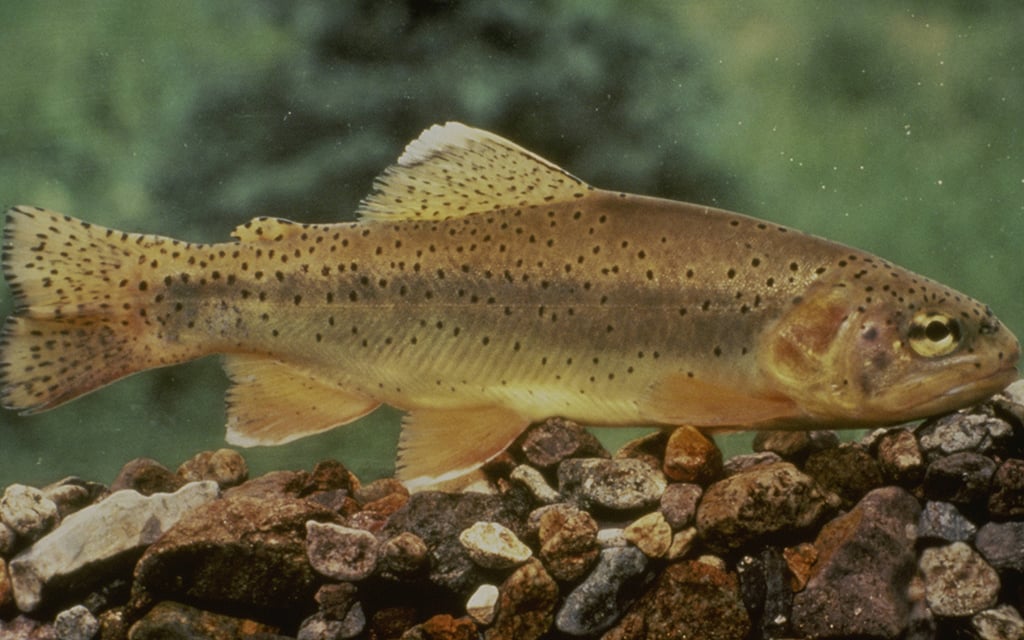WASHINGTON – U.S. Secretary of the Interior Deb Haaland declared Wednesday that Arizona’s state fish, the Apache trout, will be removed from the endangered species list – a conservation success story decades in the making.
“After more than 50 years of devoted efforts among federal, state, tribal and nongovernmental organizations, the incredible recovery of the Apache trout reminds us of the transformational power that collaborative conservation efforts – grounded in Indigenous knowledge – can have on fish and wildlife,” Haaland said at an announcement event in Mesa.
“This recovery is a testament to the importance of the Endangered Species Act and its tools and resources that are allowing the Interior Department and the federal government to protect vital species in every corner of America,” she said.
The Apache trout was listed as endangered in 1967 under the federal Endangered Species Preservation Act and later gained protection with passage of the Endangered Species Act in 1973.
In 1975, the designation was downgraded to “threatened” as efforts continued to help the fish rebound.
Gov. Katie Hobbs took part in the announcement, along with White Mountain Apache Tribe Chairman Kasey Velesquez and others.

Arizona Gov. Katie Hobbs speaks at Bass Pro Shops in Mesa on Sept. 4, 2024, at an announcement about the Apache trout coming off the federal endangered species list. (Photo by Ignacio Ventura/Cronkite News)
The Apache trout is one of two trout species native to Arizona. Ecologists blame its struggles on competition from non-native trout – rainbow, brook, cutthroat and brown – introduced into streams in the White Mountains in the early 1900s.
According to the Arizona Game and Fish Department, only a few Apache trout were left on White Mountain Apache Reservation by the early 1960s.
Efforts to protect the fish have included fencing to keep out livestock and elk, and installation of fish barriers to block non-native trout from swimming upstream. The state now stocks over 40,000 pounds of Apache trout annually in lakes and streams across northern Arizona, said James Goughnour, a member of the Arizona Game and Fish Commission.
“It’s about growing the fish, growing the genetics of the fish, making sure that they are healthy and self-sustaining,” he told Cronkite News at the Mesa event.
Haaland credited a $5.1 million investment in wildlife under President Joe Biden for helping the trout reach this point.
But Robin Silver, co-founder of the Center for Biological Diversity, said the delisting is premature due to the presence of exotic predators, along with livestock and elk. He emphasized that the trout’s habitat in higher elevation streams – above 5,900 feet – is under threat from climate change.
“This is not an endangered species that has recovered,” Silver said by phone on Wednesday, predicting that “we will just be back needing to relist them within the foreseeable future.”

Considered endangered 50 years ago, the Apache trout – Arizona’s state fish – has made enough of a comeback for the U.S. Department of the Interior to announce Sept. 4, 2024, that it will be removed from list of endangered or threatened species. (U.S. Fish and Wildlife Service photo)
He accused the U.S. Fish and Wildlife Service of giving too much deference to the state’s “notoriously unreliable and dishonest” conservation management plan.
“The reason that they’re being delisted is because it’s the policy of the Arizona Game and Fish Department to remove as much federal protection from Arizona’s native species and Arizona’s imperiled native species as possible,” he said. “The (U.S.) Fish and Wildlife Service goes along with this policy by rubber stamping whatever Arizona Game and Fish Department wants.”
Julie Carter, the Aquatic Wildlife Branch Chief at the Arizona Game and Fish Department, part of the agency’s mission is to balance the recovery of native species while also providing opportunities for anglers.
“Drought is a big problem for native fish species in Arizona, especially for native trout species because they’re up in the higher elevations and highly impacted by warmer water temperatures, decreasing flows,” Carter said.
Haaland described the delisting of the trout from the endangered species list as a collaborative effort involving the U.S. Fish and Wildlife Service, U.S. Forest Service, White Mountain Apache Tribe, Arizona Game and Fish Department and Trout Unlimited.
Cronkite News reporter Ignacio Ventura in Mesa contributed to this report.

